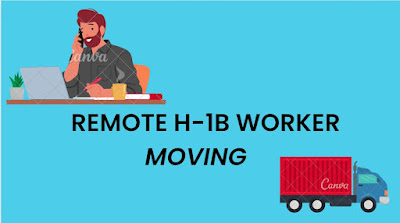Remote H-1B Workers Should take Precautions When Moving
You are here
Home / Remote H-1B Workers Sh ...
The COVID-19 pandemic brought about a paradigm shift in the professional landscape, with remote work and telecommuting becoming widespread. As businesses adapted to social distancing protocols and technology rapidly advanced, many employers embraced remote work as a permanent option. This shift was not limited to U.S. citizens or permanent residents but also impacted professionals on non-immigrant visas, such as those holding H-1B status.
H-1B Workers and the Rise of Remote Work
Among the professional workforce, H-1B visa holders, who are often employed in fields like IT, engineering, and finance, found themselves working remotely, sometimes from home. While the ability to work from home offered flexibility and safety during the pandemic, it also introduced new considerations related to compliance with immigration laws, especially concerning the "Place of Employment" listed on their H-1B petitions and associated Labor Condition Applications (LCA).
"Place of Employment" in H-1B Petitions and the LCA
In an H-1B petition, the "Place of Employment" refers to the physical location where the employee will perform their work. The U.S. Department of Labor (DOL) requires that the employer file an LCA specifying the intended worksite, which determines the prevailing wage for the position in that geographic area. The "Place of Employment" is a critical element in the petition, as it helps ensure that H-1B workers are being paid in accordance with local wage standards and that they are working in conditions consistent with U.S. labor laws.
The Requirement to Report Changes to USCIS
When an H-1B worker's place of employment changes, including switching to a new physical location for remote work, it is crucial that this change be reported to U.S. Citizenship and Immigration Services (USCIS) through an amendment. A failure to do so may result in the employee being out of status. An H-1B amendment is needed when there is a "material change" to the terms and conditions of the employment, and moving to a new worksite or home office in a different metropolitan statistical area (MSA) constitutes such a change. Although there are some exceptions, a remote H-1B worker who moves permanently to a location not listed in the original petition should have the employer file an amendment to reflect the new worksite before the move.
USCIS Site Visits and Fraud Investigations
Another critical aspect of H-1B compliance is USCIS' ongoing efforts to monitor and investigate potential fraud or abuse within the H-1B program. USCIS fraud investigators frequently conduct unannounced visits to the worksites of H-1B employees to ensure that the employee is working in the location and under the conditions specified in the LCA and the H-1B petition. These visits often involve interviews with the employer and employee and can include a review of employment records.
Instances of H-1B visa holders working from an unreported location, whether from home or another remote office, have drawn increased scrutiny. A failure to update the "Place of Employment" can lead to a finding that the employee is in violation of their visa status, which can result in severe consequences, including visa revocation and potential removal from the U.S.
Precautionary Steps for H-1B Remote Workers
In light of these considerations, H-1B visa holders who work remotely must take proactive steps to ensure they remain in compliance with immigration laws. Specifically, they should:
- Confirm that their current place of employment is listed in the LCA and the H-1B petition.
- Promptly notify their employer and attorney of any plans to relocate, even temporarily.
- Ensure that the employer files an amendment with USCIS before moving to a new location, particularly if the new location is outside the MSA listed on the petition.
- Keep detailed records of communications with their employer regarding any location changes.
- Failure to follow these steps could risk the employee's legal status, which could disrupt both their employment and ability to remain in the U.S.
Conclusion
The rise of remote work offers flexibility and convenience, but for H-1B visa holders, it also requires heightened attention to compliance with immigration rules. By understanding the importance of the "Place of Employment" and the need to report changes through an amendment, H-1B workers can avoid unintentional violations of their visa status. In the current environment of increased USCIS oversight and fraud investigations, it is more important than ever for H-1B visa holders to ensure they are following all regulatory requirements related to their worksite.
Our Promise to Clients:
- Always be polite to our clients
- Listen to our clients
- Return phone calls and emails
- Keep clients informed
- Recommend the most practical solution
Case Evaluation
Appointments
- Phone Consultations
- Weekend/Evening Appointments
- Out of State Services
- VISA/MC/AE Accepted
We serve clients from all countries and walks of life from investors, professionals, skilled labourers, and people wishing to join their family members in the USA.

Contact Us
1-732-632-9888
Paul Szeto LLC.190 State Route 27
No. Edison, NJ 08820 USA
info@szetolaw.com
Languages: English, Cantonese, Mandarin
Admissions & Associations
- Bar Admissions:
-
- New York State Bar
- U.S. Court of Appeals for the Third Circuit
- U.S. District Court for the District of New Jersey
- New Jersey State Bar
- Middlesex County Bar Association
- California Bar (inactive)
- Associations:
-
- New York State Bar Association
- American Immigration Lawyers Association
- New Jersey State Bar Association
- Middlesex County Bar Association
- California Bar Association



